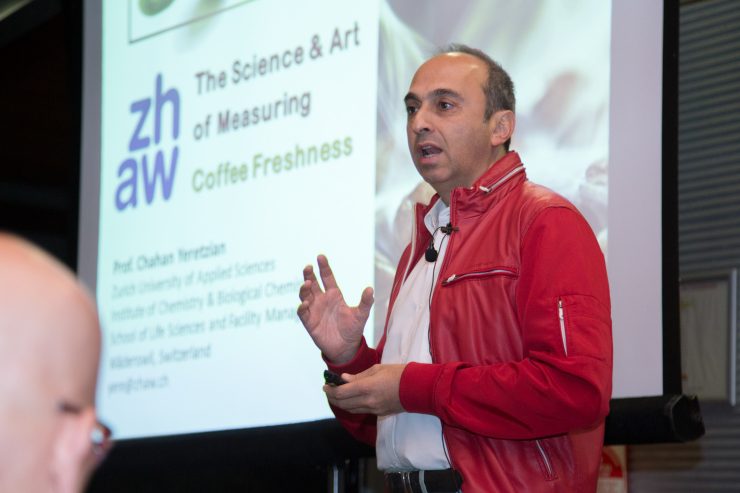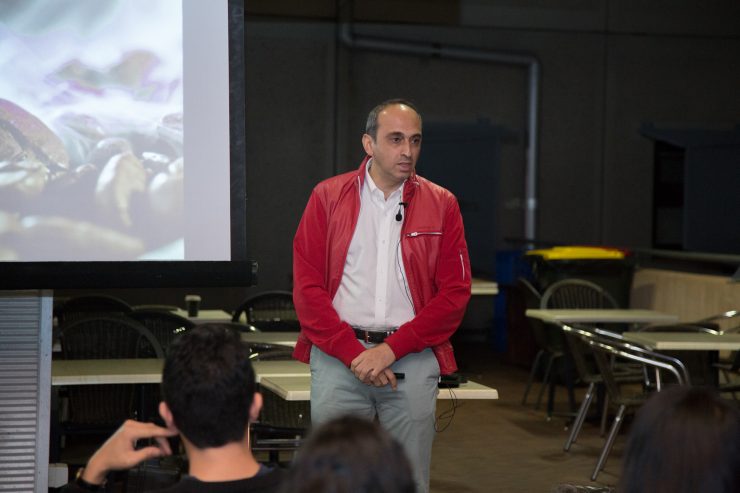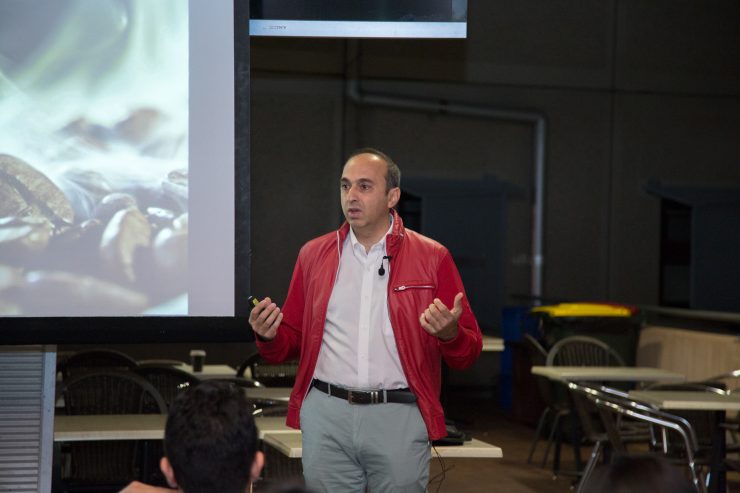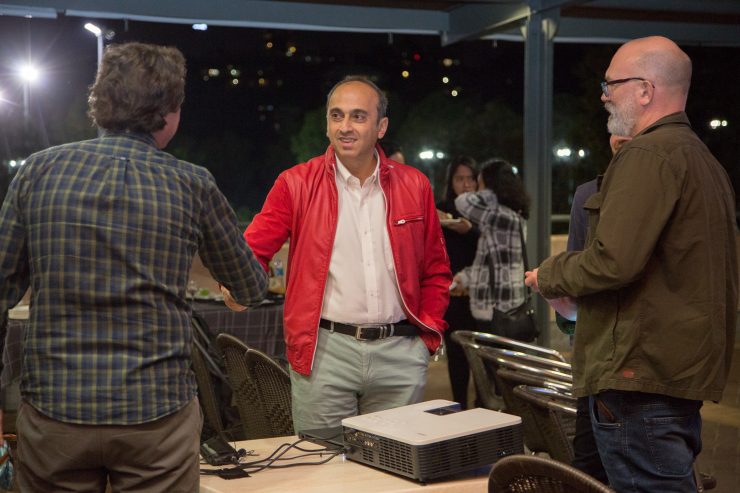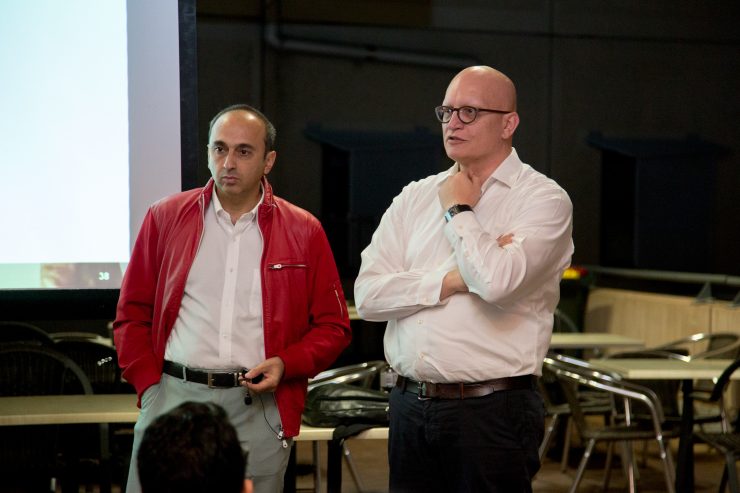A few short weeks ago, we brought news via our sister site, Sprudge Wire, about a series of educational talks hosted in Australia by our friends & partners at Toby’s Estate. The star of those talks was Professor Chahan Yeretzian, a PhD in the field of chemistry who has dedicated much of his professional career to studying the emerging science of coffee freshness. Professor Yeretzian is currently Head of the Center for Analytical and Physical Chemistry at Zurich University, and is also a member of the Specialty Coffee Association of Europe’s Board of Directors.
Professor Yeretzian took a break from his busy professional schedule to sit down with Sprudge co-founder Jordan Michelman and answer a few questions on the science and myths behind coffee freshness. His answers are technical, but also offer a directness and learned perspective that speaks to a wide audience. Is freshness a myth? Should you be putting your beans in a freezer? Are those heathens Glaville and Babinski on to something with their espresso pre-grind chicanery? Read on.
To start, please give us some background about yourself.
I’m a Swiss of Armenian origin. I studied physical chemistry and was postdoc at UCLA and then in Munich. So physical chemistry is my academic background, not coffee or food. I was going in this direction and aiming for academia, but then I got a job in Nestle in 1995.
At this time, I didn’t know people did research on coffee—I didn’t know it was a subject for serious research. Who is going to do such research on this product? But I interviewed in Switzerland and found one of the most advanced labs I’ve ever seen. I took the job.
Since then I’ve been in coffee research—starting with liquid coffee, coffee concentrates, and cans—at the time, these were all a different product than today. Then I moved into soluble coffee technologies, and was in the US to learn these technologies. Then I moved into the specialty area of Nestle, which was Nespresso at the time.
I also got an MBA in Lausanne and worked for three years as Head of a research department on culinary products—bouillon cubes, fermented seasoning, sauces, and the like. In 2006, I left Nestlé for a job at the Zurich University of Applied Sciences in Switzerland, as a professor of chemistry. Besides teaching chemistry and educating the next-generation chemists, my goal is to develop a coffee competency center, and since 2008, I’m building up a coffee competence and research center. 70% of my research is on coffee.
I also established a postgrad degree on coffee, probably the first one worldwide, to contribute toward educating the next generation of coffee professionals. This is because I worked for so many years on coffee, and today I’m doing research with a lot of international companies worldwide, from Japan to America to Europe. I am convinced that coffee industry needs a formal academic education in order to be prepared for the upcoming challenges related to quality, technology, and health.
What fact about coffee freshness do you think is most misunderstood? What’s the biggest myth?
I would say that coffee freshness has become like a religion today for the specialty coffee scene. Everyone wants that freshness; even if you grind coffee and let it stand for just 2 minutes, there are those who will say “that’s not good, you have to extract immediately.” It has become a religion, particularly for espresso.
But only were few know how to measure freshness. It’s just up to the sensory perception of people, and when you talk to people about freshness, nobody knows what it is—it’s a subjective description of their own perception.
The myth of most things in coffee is that tasting is mostly subjective. And so perhaps freshness isn’t really the ne plus ultra of specialty. There are ways to do products that don’t have that freshness inherent, but to do them well, you have to be able to measure it and know what it is.
I think it is giving freedom to the people, to understand what freshness is, and to create products that don’t necessarily fit the concept of freshness—like cold brew, or cold drinks. These products are not “fresh” products: they’re in a bottle, and shelf-stable for several days or a week. But freshness is something so subjective and difficult to communicate. So that’s the issue, and that’s my desire right now, to show how you can measure freshness and then also motivate people to think beyond freshness. Perhaps there are things that aren’t “fresh” that are good, you know? This is not a myth.
When is coffee too fresh?
Well, you can measure freshness two ways—let me give you a short introduction to that concept. First, you can measure it through aroma. This is one of the elements we consider important to quality coffee. The aroma of roasted bean…if you measure it, you see a loss of freshness between a few days, even one day. So if you consider aroma of roasted whole bean coffee as *the* way to follow it, you can say that within one day it has lost freshness.
But there’s another attribute to consider, and it’s the CO2—because aroma as well as CO2 are both generated during roasting, and the end of roasting is like a clock that starts ticking immediately. For the CO2, the issue is more complex, but basically, if you have too much gas in your coffee, the whole extraction and brewing process is affected. Think of it like this: during the first week after roasting, your coffee is like a living organism. It is degassing so much, it is constantly evolving. And during that first week, the notion of loss of freshness is possible from an aroma perspective, but in terms of CO2, you would say it is evolving, but not losing freshness—it’s too dynamic.
So in my perspective, you have an evolution in flavor, but I wouldn’t call it a “loss of freshness” the first week. Remember, it’s a living organism. Then after the first week, the coffee starts to calm down; at this point, it has lost something like 60 percent of its CO2, so it becomes more calm and more stable. And so after a week, that’s when I think you can start looking at changes as loss of freshness, particularly in the aroma.
The first week everything happens so fast! The problem is, in order to master the coffee in the first week, it evolves every day, so you have to address adjusting your machines and grinders…from a CO2 perspective, the first week is quite dynamic, So, I wouldn’t think of it as aging; it’s more a calming down.
So it’s a question of perspective. In my opinion, the first week is just changes, not loss, if you store the coffee properly.
There is a popular practice here in America, advocated by food writers like Alton Brown and others, that says coffee can be stored for freshness in the freezer. In your expert opinion, should coffee ever be put in the freezer?
Coffee ages slower if you cool it down. All the changes that we see, especially when it comes to aroma, are slowed down incrementally by 10 degrees at a time. If you cool coffee just 10 degrees below room temperature, this “aging” process will be slowed down by a factor of 2. It has been proven that aging is slowed down if you keep coffee cold, but by no means does this mean you should freeze your coffee. In fact, I would say you should not freeze specialty coffee—freezing might change its structure, and cause individual beans to crack.
But there’s another issue at play when you consider freezing or refrigerating coffee. Once you take your coffee out of the fridge and you open it, introducing it to warmer air, this will result in considerable condensation on the coffee, which is extremely damaging in terms of aroma and structure. So the damage that happens when you open a coffee bag cold will more than overcompensate for what you will slow down during cold storage.
It’s true that cold storage can help slow down coffee aging, but then when you go and open it at room temperature, any benefits of cold storage are more than negated by condensation. One simply has to understand how cold storage works: the storage itself is okay, but opening it is not okay, unless you were only going to open the coffee bag and make coffee with it in a room that was quite cold.
Why does grinding coffee fresh before each brew matter so much? Does it?
For the product espresso—which is, I would say, the mythical product of the specialty scene, the most important product—if you want freshness from the aroma perspective, and you really have to have fresh coffee. You have more aromatic complexity and intensity this way. For the espresso coffee, freshness matters.
But more and more as we enter specialty, the more people are becoming like culinary chefs, working with this incredibly aromatic product. So there are other dimensions, other possibilities, to create beverages and aromatic impressions out of coffee that are not espresso. And now, depending on what you’re going for, which direction, then you don’t have to look into freshness the same way. Typically, the cold brew or the nitro brew coffee, these kinds of products that are coming out, their flavor profiles are not necessarily related to freshness—the flavors in these drinks are the result of extraction instead, and you can keep these coffees stored for a while. The notion of freshness is still there of course—if you let a cold brew stand for a year, it will become acidic and undrinkable—but cold brew isn’t like an espresso, you don’t have to drink it 30 seconds after the beverage is made.
For espresso coffee? I believe we have to respect the aspect of freshness. A week off roast is fine in my opinion, and then freshly ground, fresh extracted, and freshly consumed. This is what it’s all about.
But for other beverages, especially these cold brews and nitro brews but also other products, freshness is more relative. It’s still a component—you still want to use good origins—but the way it is prepared allows more creativity and accepting things outside the arena of freshness. Because coffee might reveal other flavor profiles that we haven’t seen in this strict freshness domain.
Last question: you mentioned that for espresso, this is a drink that’s all about freshness and immediacy. But we know people in specialty (particularly at G&B Coffee and Go Get Em Tiger in Los Angeles) who are playing with the concept of freshness by pre-grinding coffee their coffees for espresso up to an hour before they pull shots. What’s your take on that?
I believe that it’s so important people play around with this, because that’s the only way we can understand coffee, and the more we understand, the more rational we are, and the more courageous we can be. I think this is very important. People are now more knowledgable and creative than ever when it comes to coffee.
What you said about grinding and letting it stand for an hour, I think this is very important to play around with. A lot is happening with CO2 degassing—pre-grinding for an hour, it *will* change the flavor profile and the extraction dynamics. The water will extract more. but allowing it to have some kind of “forced aging” in order to condition the coffee optimally for extraction, that’s absolutely something interesting. Grinding one hour before and letting it stand, or other such ideas, this I would call conditioning the coffee for optimal extraction, and there’s a lot of places to explore this concept.
We have the right to go against the concept of absolute freshness, because we don’t know whether grinding one hour before will create a new sweet spot. It is very important we are not too religious about these orthodoxies and encourage such experimentation.
But the bigger question is: do you call such a drink traditional espresso? Should the term “traditional espresso” be reserved for only the very freshest coffee? When you play with things like pre-grinding, are you really talking about a new generation of espresso? I don’t know the answer to that…but I do know that espresso as a beverage is so complex and fascinating, and there is still much more room to explore.
Jordan Michelman is a co-founder and editor at Sprudge.com. Read more Jordan Michelman on Sprudge.
The post 5 Incredible Myths Of Coffee Freshness, Revealed appeared first on Sprudge.


